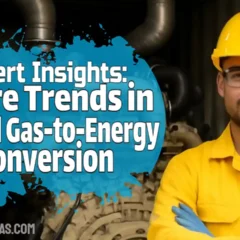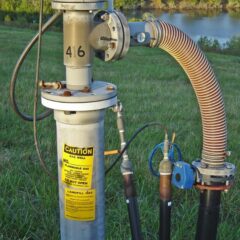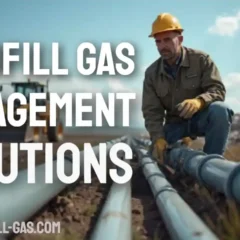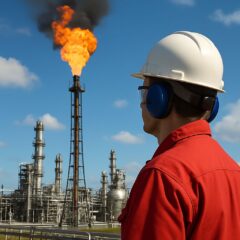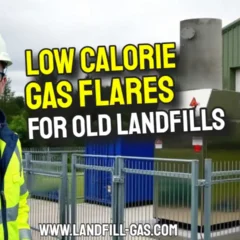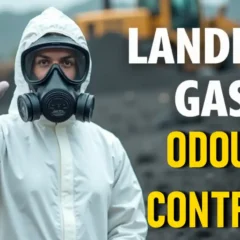Landfill Gas Management
Landfill Gas Management is an important necessity at most landfills receiving degradable wastes such as MSW and many non-hazardous industrial wastes. It is necessary to extract landfill gas in order to prevent it from migrating away from the landfill.
Landfill gas (LFG), a mixture of methane and carbon dioxide, has the potential to cause harm to human health, via explosion or asphyxiation, and to cause environmental damage such as crop failure. It also has a significant climate changing effect in the world’s atmosphere.
Examples of all three have occurred both within and outside landfills and are discussed here.
Landfill Gas Management is applying good practice techniques for extracting and controlling LFG. All are are now reasonably well established and in common use, and are discussed in this category.
Expert Insights: Future Trends in Landfill Gas-to-Energy Conversion
Landfill gas conversion holds potential as a $1.9 billion industry, yet many landfills lack gas collection. Innovations in gas collection, early installation, and real-time monitoring could cut U.S. landfill methane emissions nearly in half, addressing climate goals and boosting the renewable energy sector…
US Landfill Gas Resources: A Booming Green Energy Sector
Untapped U.S. Landfill Gas Resources are an Opportunity for Green Investment The American landfill gas (LFG) sector has seen a big change in recent years. It’s now a key player in the country’s biogas world. Even though it’s only 23% of over 2,500 biogas systems now installed nationwide, it captures 72% of all biogas by […]
Landfill Gas Management Solutions
You know the tough part about landfill gas is that the problems rarely show up one at a time. Odors, off-site migration concerns, wellfield instability, and methane emissions can all trace back to the same root issue: gas is finding an easier path than the one you built for it. All this leads to the […]
Gas Flare Systems: Enhancing Safety and Efficiency in Landfill Gas Operations
Proper landfill gas flare systems can achieve up to 99.5% methane destruction efficiency, reducing environmental impacts. Enclosed systems enhance emission control. Safety features like flame arrestors prevent incidents. Flares integrate with energy recovery, transforming waste gases into renewable resources, offering compliance and sustainability benefits for landfill operations…
Best Enclosed Landfill Gas Flare Stack Suppliers & Manufacturers
Enclosed landfill gas flares are crucial for sustainable waste management, offering up to 99.9% methane destruction. Top suppliers like John Zink and Zeeco provide advanced systems with features minimizing emissions. Compliance is easier with these solutions, ensuring effective gas management and environmental protection…
Low Calorie Gas Flares for Old Landfills
Managing emissions from ageing landfills is challenging due to low methane levels. Low calorie gas flares use air-mixing technology to ensure consistent combustion, reducing greenhouse gases. Compact and effective, these flares provide a sustainable solution for sites with declining gas production, addressing odour issues and regulatory needs…
Landfill Gas Composition Analysis & Trace Chemical Breakdown
Landfill gas primarily consists of methane and carbon dioxide, but also contains trace volatile organic compounds that pose risks. From environmental monitoring to energy recovery, understanding landfill gas composition is essential. This analysis helps navigate concerns arising from waste decomposition over time and landfill design factors…
Is Your Landfill Site Ready? Assessing When to Install Gas Flares & Landfill EfW Systems
The urgency for compliance with the COP29 methane pledge means waste managers must act immediately. Gas flares are mandatory for low volumes, while EfW systems transform hazards into valuable energy. Install EfW when LFG is significant and steady to secure compliance and profits ahead of deadlines…
Biogas Compression Equipment Safety: Your Essential Checklist
Maintaining biogas compression equipment is crucial for preventing explosions and toxic gas exposure. Key safety measures include using explosion-proof components, routine inspections, and personal protective equipment. Proper practices ensure operational safety and facility integrity, safeguarding personnel and assets from potential hazards. Explore the essential safety checklist to stay protected…
Best Practices in Odour Control Using Landfill Gas Extraction Systems
Landfill gas extraction systems effectively control odour by capturing and treating gases from decomposing waste. Proper system design, strategic well placement, and regular maintenance are crucial for minimizing fugitive emissions and odour complaints, with reductions of up to 85% achievable when these best practices are followed…

